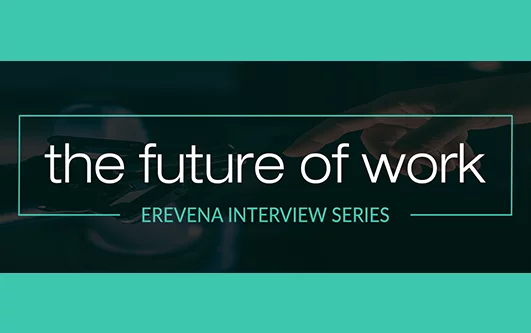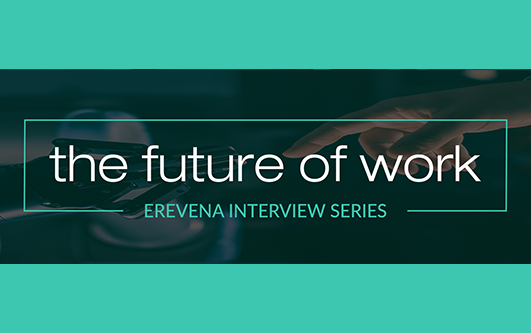Ingrid Ødegaard, Co-founder and Chief Product and Technology Officer of Whereby, believes the way we work will look radically different in three to five years’ time – and the journey has already begun. She talks to Erevena, about the phenomenal rise of video conferencing and how Whereby has built a European powerhouse that’s taking on the US giants.
Tell us about Whereby – where, when and how did you start?
We began in 2013 as a start-up inside the biggest telco in Norway, Telenor. At the outset it was an intern project to explore an easier way to have video calls. Telenor was investing in new services and our tech-driven project saw the launch of a pioneering browser-based video conferencing service called appear.in. In 2017 we spun out as a separate company with new owners, Norwegian company Videonor. Two years later in 2019 we rebranded our service as Whereby.
What is Whereby all about?
From a technical perspective, its premise is simple. It’s a video conferencing service that works straight in the browser on a phone or laptop. There’s no app or software to download – just a simple click. Our focus from the outset was to remove the friction around getting people on a call quickly.
Culturally, Whereby is on a mission to give people the freedom to work and live where they thrive. It’s about flexibility. About enabling people to set up and run meetings from anywhere. Employees are happier when they have this kind of flexibility. And happy employees are productive employees. We don’t just believe this is important to our customers, it’s fundamental to how we have built our company.
Can you describe your growth path?
We were born global. In just four months following our launch, we had customers in 175 countries and have since grown the business organically. Our task has been to build a sustainable business, taking us beyond a purely free product to one that companies will pay for. Following our rebranding in 2019, we anticipated that our approach to flexible remote working would take three to five years to become mainstream. And then COVID-19 happened. In February last year we had 25 full-time employees and now nearly a year later we have more than 80. We went from employing just four nationalities to 23 working in 17 countries, from Bali to San Diego!
How did you manage this sudden growth from a recruitment perspective?
All our hiring has been done remotely since March last year and it has worked really well. It wasn’t a shock for us because we’d set ourselves up to handle remote onboarding several years ago – it was our vision and reflects Whereby’s raison d’etre. We’ve always wanted to feel our customers’ pain so that we can help them. That’s why our first use case was ourselves. We are a fully flexible remote team spread across 12 countries and use our own technology to enable this distributed model.
Hiring remotely has also given us access to candidates we might not have been able to reach. Our VP of People and Talent Jessica Hayes has been at the forefront of helping clients and candidates adapt to the concept of remote recruitment. In a recent blog, she wrote:
“Being able to recruit from everywhere totally changes the game in terms of the opportunity to invite new backgrounds, histories, languages, ethnicities, cultures, and perspectives into your teams.”
How have you funded your growth?
Our VC funding is one of the best around. It has given us the confidence to build ambitious growth plans and our investors, Point Nine Capital, continue to push us to go further than we otherwise might have. There is currently a lot of investor interest in Whereby, but we are just focusing on the next phase of our growth. We have the basic organisation design principles in place to manage this growth and are working on how to take this forward in a post-pandemic world, with new revenue models, new talent and new products.
Tell us a little bit about these new products?
With the pandemic forcing people to move their businesses online, we’re focused on building products to help them work better. We had already begun this process with the launch of Whereby Embedded in 2019 – our API for embedding video meetings in a website or company app. We originally had just one salesperson selling it because it was so new but from March 2020 we were flooded with enquiries about the product. Fortunately, our parent company was able to move sales support across from another business to help us out while we brought our own sales team up to scratch.
We are still reinventing our products. For example, we’ve added new functionality, such as collaboration features like the Miro whiteboard. 2021 will be a year of continued innovation and at the core of this remains user value through product simplicity. It’s one of our differentiators. Our plug and play products are designed so that your grandmother can use them. This has been especially important during lockdown.
What difference does Whereby make to people’s lives?
Whereby gives people back control of their working day. It allows them to work to their own rhythm – from anywhere, at any time. In Norway, we are used to the subway and trains not running due to snow and now companies all over the word have discovered the value of remote and flexible working.
Our work for UK firm accuRx is a great example of where we’ve made a difference. They’re a booking solution provider to the NHS and approached us on a Friday evening to implement Whereby Embedded. By Monday accuRx were rolling out secure video conferencing to 3,500 GPs in the UK.
What challenges do you see ahead for 2021?
Recruitment is one area. We receive a lot of incoming applications but finding the good ones is a challenge. We need people with the right skills, attitude and interpersonal traits. That’s why we’re working with Erevena to find our new VP of Engineering, as we know they will find the best person for us, wherever they are located.
Our culture is built on truth, sharing and collaboration. There is no room for egos. We have done a lot of work on our on-boarding process and our people tools have been revamped to meet the needs of a remote team. Jessica Hayes has been at the helm of this and says:
“Working remotely brings unique challenges and opportunities. We know we need to create a cultural experience virtually which makes our team feel psychologically safe, organised, and prepared to take on all of the projects and challenges we have in store. For this reason, we adopt a Product-Team mindset in the People Team and work with a suite of tools like Back, Platypus, Notion, and Lever so we are always delivering beautifully designed, tech-enabled work experiences.”
Another challenge is to ensure we get everyone aligned with our goals when we’re all working remotely. At the same time, we need to leave room for new and fresh ideas. People must feel that they can innovate. 2021 is going to be our year for innovation in engineering.
What sets Whereby apart?
I’ve already mentioned our rationale to keep things simple and that’s an important differentiator. Things like being web-based and our room model are core to this. We also don’t want the technology to get in the way of great meetings. They should just work. Again, the simplicity of our technology is an enabler of this.
Users can personalise their own meeting room with company branding or something more personal if it’s a non-business room, while collaboration tools make meetings immersive and interactive. Our Norwegian heritage is important to us. We are a European company, with global reach.
How do you see the Future of Work?
It will be radically different. We believe that we are still at the beginning of a big transition to a new way of working. This implies structural changes in society, for example as people who are able to work remotely shift from busy urban areas to local work bases. We see our products as a starting point for going on the journey to this new world.
We want to be the driving force of this change, with a focus on quality and happiness at work rather than measurement-based working. This is especially important as the world of work becomes increasingly knowledge-based with AI taking over a lot of manual work. Personal happiness will become a measure of a great employer.
Share this article:












